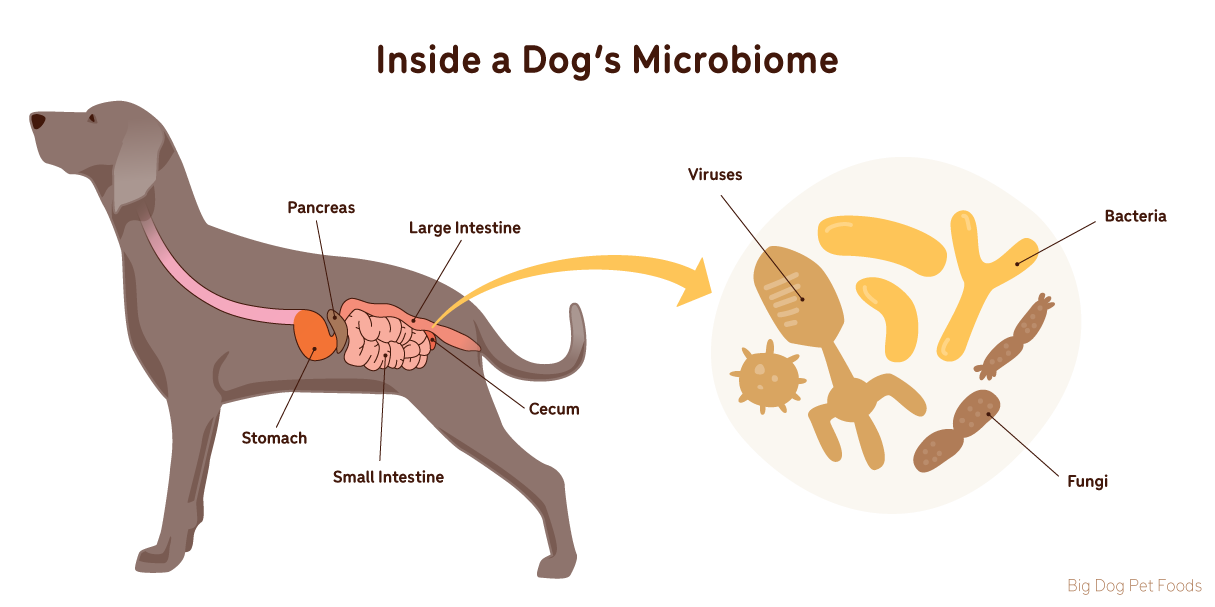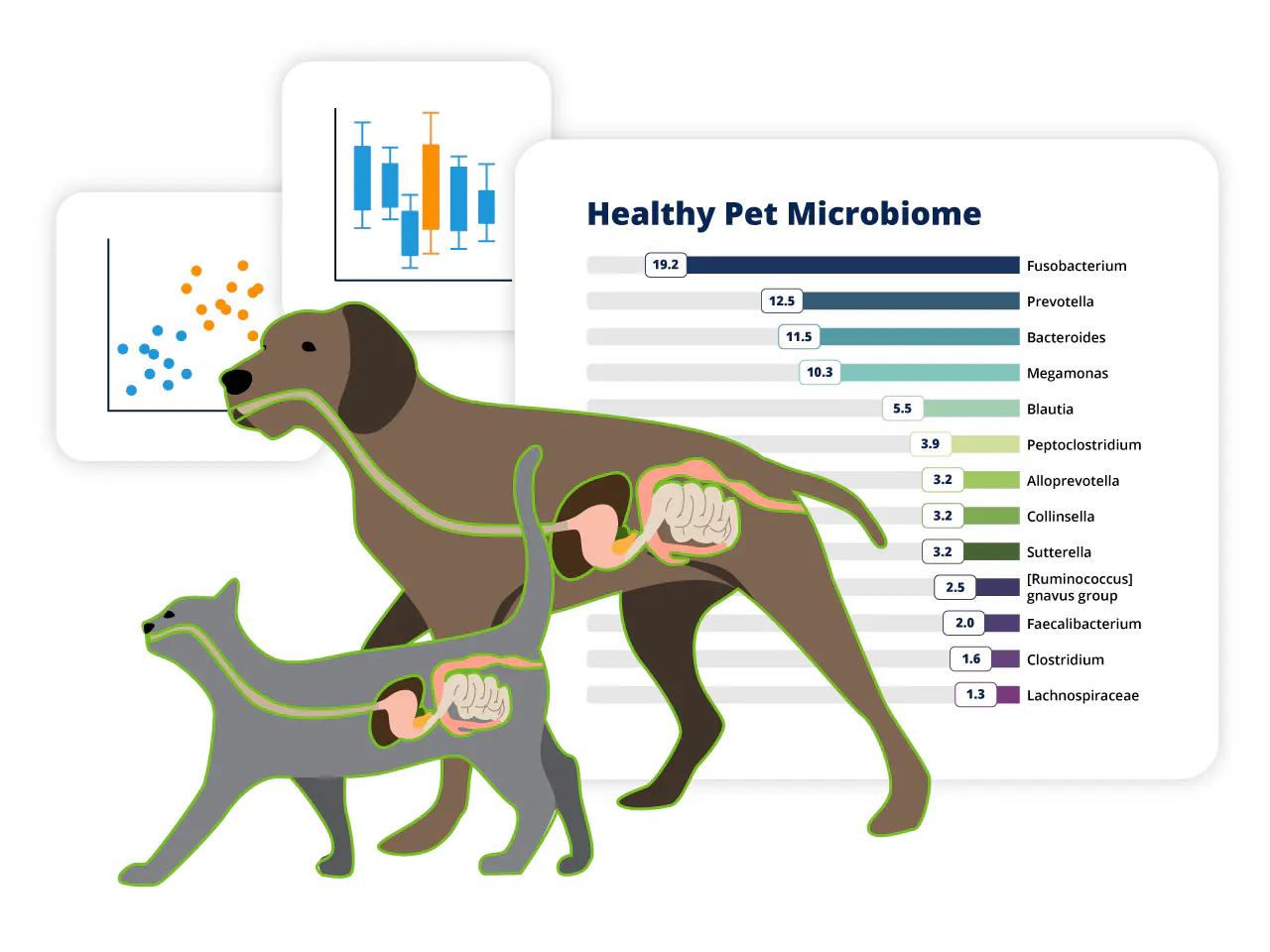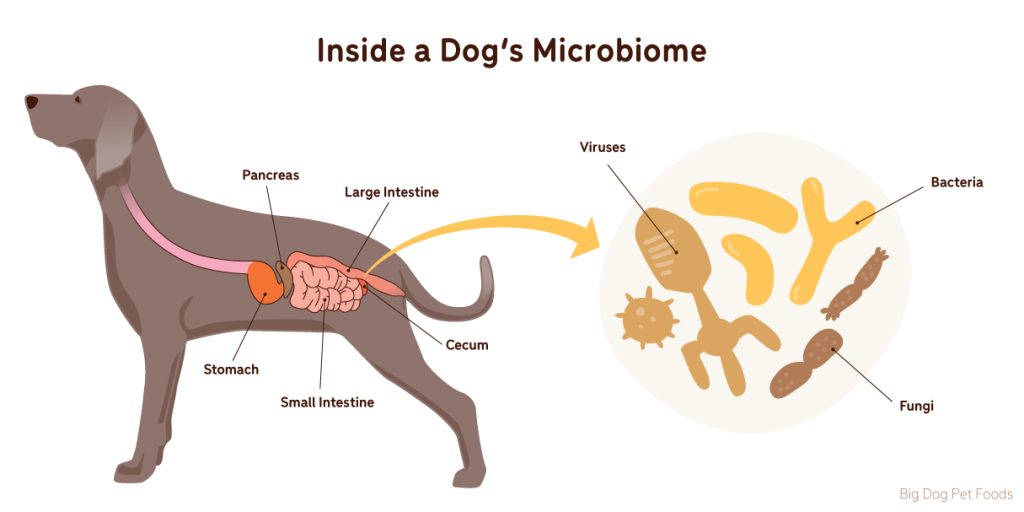Gut Microbiome in Dogs and Cats: Impact on Behavior and Immunity
The gut microbiome in dogs and cats is a complex ecosystem of bacteria, fungi, and other microbes. These tiny organisms live in the digestive tract, influencing health, behavior, and immunity. Understanding their role can help pet owners improve their pets’ well-being. This article explores how the gut microbiome affects behavior and immune function in dogs and cats.

What Is the Gut Microbiome?
The gut microbiome consists of trillions of microorganisms in the intestines. These microbes aid digestion, produce nutrients, and protect against harmful pathogens. A balanced microbiome is crucial for overall health. In dogs and cats, it varies based on diet, environment, and genetics.
How the Gut Microbiome Affects Behavior
1. The Gut-Brain Axis
The gut and brain communicate through the gut-brain axis. Microbes produce chemicals like serotonin, impacting mood and behavior. A healthy microbiome can reduce anxiety and stress in pets. Imbalances may lead to aggression or hyperactivity.
2. Stress and Anxiety
Studies show gut microbes influence stress responses in dogs and cats. A balanced microbiome promotes calmness and emotional stability. Probiotics can help reduce anxiety during stressful events like vet visits. Conversely, poor gut health may increase fearfulness.
3. Behavioral Changes
An imbalanced microbiome can cause erratic behavior in pets. For example, dogs with gut dysbiosis may show increased aggression. Cats might become withdrawn or overly vocal. Restoring gut balance often improves these behaviors.
Impact on Immunity
1. Strengthening the Immune System
The gut microbiome acts as a barrier against pathogens. It trains the immune system to recognize harmful invaders. A diverse microbiome enhances immune response in dogs and cats. This helps them fight infections more effectively.
2. Reducing Inflammation
Gut microbes regulate inflammation in the body. A healthy microbiome reduces chronic inflammation, preventing diseases. In contrast, an imbalanced microbiome can weaken immunity, leading to allergies or infections. Proper gut health is vital for long-term wellness.
3. Fighting Diseases
A robust microbiome helps pets resist diseases like parvovirus or feline leukemia. Beneficial bacteria produce compounds that kill harmful microbes. This natural defense system supports overall immune health.
Factors Influencing the Gut Microbiome

1. Diet
Diet plays a major role in shaping the microbiome. High-quality, fiber-rich foods promote beneficial bacteria. Processed foods or sudden diet changes can disrupt gut balance. Always transition diets gradually to avoid stress.
2. Stress and Environment
Stress from loud noises, travel, or new environments affects the microbiome. Chronic stress reduces microbial diversity, weakening immunity. A stable, calm environment supports a healthy gut.
3. Medications
Antibiotics can disrupt the gut microbiome by killing beneficial bacteria. While necessary for infections, overuse may harm immunity. Probiotics or prebiotics can help restore balance after antibiotic use.
How to Support a Healthy Gut Microbiome
1. Provide a Balanced Diet
Feed dogs and cats high-quality, nutrient-rich food. Include fiber from vegetables or whole grains for dogs. Cats benefit from protein-rich diets with minimal fillers. Consult a vet for tailored diet plans.
2. Use Probiotics and Prebiotics
Probiotics introduce beneficial bacteria to the gut. Prebiotics feed these bacteria, promoting growth. Supplements or fortified foods can improve microbiome health. Always choose vet-approved products for safety.
3. Minimize Stress
Create a calm environment for your pet. Regular exercise, playtime, and a consistent routine reduce stress. Avoid sudden changes in their surroundings. This helps maintain a balanced microbiome.
4. Regular Vet Checkups
Routine vet visits detect gut health issues early. Fecal tests can reveal microbiome imbalances. Vets may recommend dietary changes or supplements. Early intervention prevents long-term health problems.
Common Signs of Gut Microbiome Imbalance
-
Digestive Issues: Diarrhea, constipation, or vomiting.
-
Behavioral Changes: Increased anxiety, aggression, or lethargy.
-
Skin Problems: Allergies, itching, or hot spots.
-
Weak Immunity: Frequent infections or slow recovery.
If you notice these signs, consult a vet immediately.
Why It Matters for Pet Owners
A healthy gut microbiome improves your pet’s quality of life. It reduces behavioral issues, making them happier companions. Strong immunity means fewer vet bills and a longer lifespan. By focusing on gut health, you invest in your pet’s overall wellness.
Challenges in Maintaining Gut Health
Not all pets respond the same to microbiome interventions. Some may resist dietary changes or supplements. Patience is key when adjusting their routine. Work closely with a vet to find the best approach.
Conclusion
The gut microbiome in dogs and cats plays a vital role in behavior and immunity. A balanced microbiome promotes calm behavior and strong immune defenses. Diet, stress management, and probiotics are key to gut health. By prioritizing microbiome care, pet owners can ensure happier, healthier pets. Consult your vet to start supporting your pet’s gut health today!
See more:
Regulations for Pet Air Travel to Europe
How to Train Your Pet to Get Used to Car Rides in Hot Weather
INTERNATIONAL PET TRANSPORTATION

